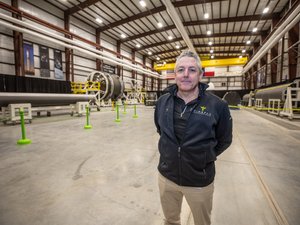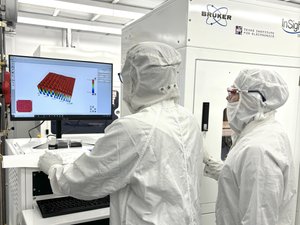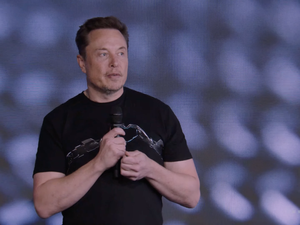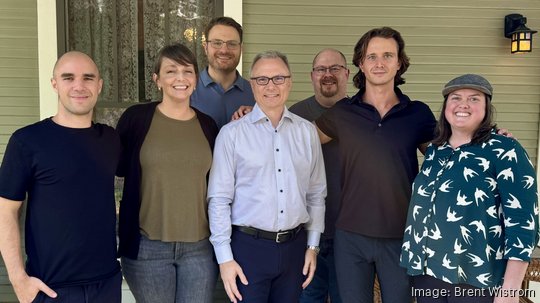
Former Silicon Labs CEO Tyson Tuttle has a new AI startup.
It's been stealthy for a while, and the young company remains a bit mysterious as it continues developing its products.
But there's plenty to chew on.
Tuttle describes the new company, Circuit Inc., as an AI startup that will allow users to apply the new technology to the mountains of non-public data that is typically locked away in private computer files, emails and internal databases.
"If you think about what Google does, it's really about finding information and data. But it doesn't read, it doesn't actually understand," he said. "It's like, 'Here's some stuff that's relevant to what you're doing,' but it doesn't actually understand what's going on. And for the first time, we're going to be able to take all of that data and information and turn it into insights and into, essentially, knowledge."
Its target audience is basically everyone with access to a smart device such as a phone or computer. Tuttle's vision is for it to be a transformational platform used for personal and professional endeavors.
"Every worker, every community member, every individual would be somebody who would be able to use Circuit," he said. "This is not just an enterprise SaaS play, it's not just a consumer play, it's really building a new platform across the top of all that, that is useful in companies internally and externally, in the community and in our personal lives."
To get there, Tuttle says he's doing what he loves most — building.
That includes creating a team with several former Silicon Labs employees. Among early team members with a background at Silicon Labs are Jackie Padgett, a former senior global marketing manager; Deirdre Walsh, former global head of marketing and communications; Andrew Peters, former global head of growth and revenue operations; and Oivind Loe, former senior manager of strategic marketing.
Matt Weiss, a former U.S. Marine Corps intelligence officer and corporate development officer at Anduril Industries, was brought on as co-founder and chief operating officer.
Funding and an acquisition
Atop that, Circuit has acquired fellow Austin startup Molecula, which has developed database technologies that manage high volumes of information that will help Circuit's data processing speeds. Altogether, Circuit has about 30 employees, and Tuttle said that number will likely double within the next year or so.
Terms of the acquisition haven't been disclosed. Former Molecula founder and CEO H.O. Maycotte is now a strategic advisor to Circuit and most of Molecula's team is now part of Circuit. That includes Patrick O'Keeffe, who was chief technology officer at Molecula and is now vice president of engineering with Circuit.
"We basically have brought on that team and that technology and that pipeline of customers with a new strategy," Tuttle said.
Meanwhile, Circuit has raised an undisclosed amount of initial funding through SAFE agreements, or simple agreements for future equity, with several tech executives and people close to Tuttle. The funding will give the startup at least six months of runway. It plans to raise additional capital in the future but didn't disclose target amounts or timing.
The young company has set up shop in a renovated Old West Austin house built in 1910. Behind it, the company has a newly constructed conference room with Tuttle's office and a garage. On a recent visit, the house was buzzing with a couple dozen employees taking video conference calls and using whiteboards to chart out product roadmaps.
While Circuit hasn't fully revealed its products yet, the company is emerging in an incredibly competitive space. Thousands of AI startups have launched in the past couple of years, often riding atop the technology of OpenAI, Anthropic, Meta and other generative AI large language models.
But Tuttle views Circuit as standing apart from the crowd.
"We're our biggest competitor," he said. "Our success hinges more on our ability to execute on our plans, and the quality of our ideas than it does what somebody else does."
A foundation launches alongside a startup
Tuttle, who has donated to and been on the boards of several media and civic organizations, said Circuit is launching the Circuit Foundation alongside the new startup as a way to ensure the company gives back to the community and that the foundation grows in tandem with the company's future valuations.
"A good corporation will give away 1% of profit, on a good year, to philanthropy. So a billion dollar company would give away a couple million dollars a year," he said. "So basically the founders and the employees are pledging 20% of our stock or equity into the foundation from day one."
The foundation will be focused on AI training, education, workforce development, applications of AI that can solve big problems or local problems. It will be a nonprofit and will have separate governance and a separate board.
"As we succeed as a company, the foundation is also going to succeed," he said. "Our goal is to make it the largest foundation in the country. And in that, when we go public, over 10% of our equity would be held by the Foundation."
The model will also allow the company to get tax benefits.
"It's actually a win-win," he said.
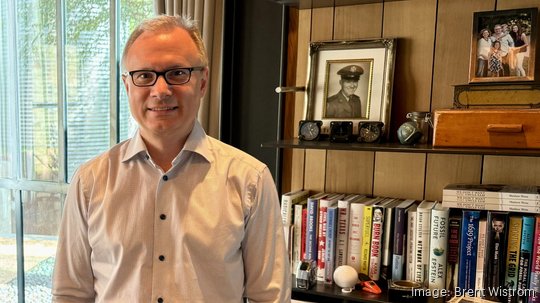
From personal stealth to startup intensity
Tuttle's final years at Silicon Labs were tough.
"The pandemic, I think, was just difficult for everyone, and I think especially when you're running a public company," he said. "We had 12 sites around the world. We had done an acquisition. We were navigating a supply chain. We went through a divestiture and a CEO transition and that was all in like 15 months."
He decided to take some downtime.
"I don't think I'd ever taken more than a weekend off since I was like 14 years old," he said.
When he left at the end of 2021 after 25 years with Silicon Labs, he felt it was time to decompress, though perhaps not in the traditional ways you might imagine for the former CEO of a publicly traded company.
"I don't play golf, and I get bored at the beach," he said.
Instead, his focus was on family, as well as a couple month-long trips to Europe. His son is headed off to college, his daughter got married and had a child and his youngest is in high school.
But Tuttle, who is known for citing how many hours there are in a week beyond the standard 40-hour work week, still felt driven to build.
"If I think back to all the fun that I've had during my career, it's been when you start at zero and you build something from scratch, where you have that spark and that idea, and you build a team, and you get everybody excited, and you put together the product plans, and you execute on your product, and then you execute on getting that out into the market and driving revenue," he said.
Tuttle, who studied neural networks in college well before they became commonplace, said he wanted to do something that would have an impact on the world, in addition to making money. After seeing little use for AI a few decades ago, the technology hit a remarkable inflection point with the public launch of ChatGPT.
He began developing a vision to create more value through a new layer atop AI that could help people navigate the overwhelming flow of information in the modern world, such as news feeds, blogs, social media, academic research and more.
"You can do something with good intentions. But, unless it has profit and revenue behind it, it's never going to be able to make it. If you want to make an impact you've got to build a large successful, profitable business," he said. "And then you can afford to do the things that actually go and not only make a lot of money for your investors and for your employees and everyone else, but also can then go out and impact the world. ... That's ultimately where the rubber meets the road."

